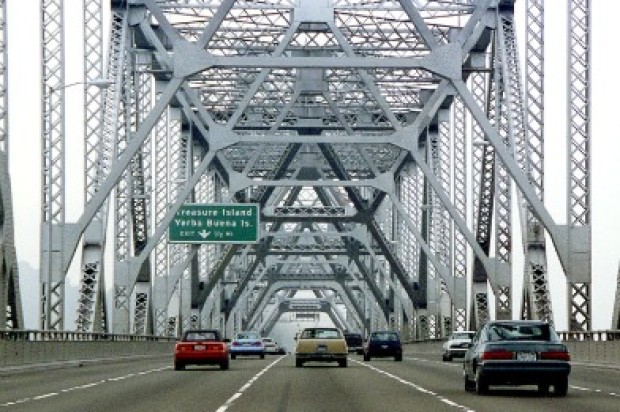
Thousands more motorists have been crossing Bay Area bridges each day of an ongoing BART strike that started Monday, according to the Metropolitan Transportation Commission.
The MTC, which oversees several Bay Area bridges, has been tracking motorists crossing its spans, and the Bay Bridge has been bearing the brunt of slow-moving traffic as the strike continues.
According to the MTC, there were 132,295 motorists that crossed the tolls at the Bay Bridge Tuesday, a bump up from Monday’s 128,065 motorists.
Before the strike, an earlier Monday in June saw 125,892 motorists, according to MTC officials.
MTC spokesman John Goodwin noted observations on the Bay Bridge during the strike, such as many new customers on the bridge, many of whom do not have FasTrak cards and were quickly filling the cash lanes.
On Tuesday, Goodwin said more cash lanes were opened to accommodate the cash toll demand, but that caused bigger back-ups for FasTrak cardholders.
He said the agency is working to find a better balance if the strike continues.
Today Goodwin said demand is lighter on the Bay Bridge and “today has been a much better trip.” However, he advised not telling that to commuters who were stuck in traffic on Interstate Highway 580 this morning attempting to cross the bridge from Oakland.
Other bridges also saw more motorists crossing the first two days of the strike.
The San Mateo Bridge processed 55,014 cars on Tuesday, compared to the 47,663 drivers at this time last year.
On the Carquinez Bridge there were 55,469 cars on Tuesday, which was up from a previous Monday in June that saw 52,510 vehicles.
The Richmond-San Rafael Bridge saw a slight increase in traffic with Tuesday rides reaching 37,862.
On the Golden Gate Bridge, fewer motorists crossed the toll plaza of the bridge than usual during the first two days of the strike.
Today there were 14,523 southbound drivers on the bridge, however that is 1,491 drivers less than the same day last week, bridge officials said.
On Tuesday there were 12,850 cars that crossed southbound, which is 604 fewer drivers than the week before.
Goodwin said traffic patterns have been skewed with typical commute hours starting at different times with drivers trying to beat the anticipated crowds.
He said there was not any official MTC data on those rush-hour changes.
Sasha Lekach, Bay City News









